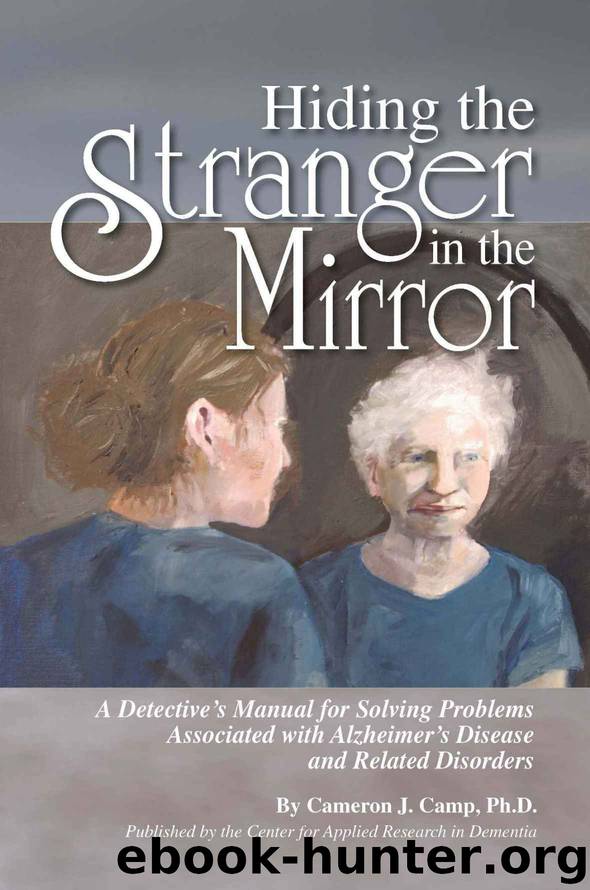Hiding the Stranger in the Mirror: A Detective's Manual for Solving Problems Associated with Alzheimer's Disease and Related Disorders by Camp Cameron

Author:Camp, Cameron [Camp, Cameron]
Language: eng
Format: epub
Publisher: Center for Applied Research in Dementia
Published: 2012-11-11T16:00:00+00:00
Have I Taken My Pills Yet?
Persons with dementia can have difficulty with the concept of time. This is another manifestation of memory loss and other cognitive deficits associated with dementia. A common problem associated with this is seen in a person with dementia who wants to know whether or not something has taken place yet that day. For example, a person with dementia may want to know if he has taken his pills yet or if a certain activity has or has not yet occurred. A caregiver can tell him that he has or has not taken his pills, or that he has or has not gone to an art activity, but this verbally communicated information can quickly leave his memory. In addition, telling someone with dementia that an event will take place in an hour may not have the same meaning as it would to a person without dementia. Think of telling a three-year-old that something will take place in an hour. In both cases, they are missing the sense of how long an hour is.
What is needed is a way for the person with dementia to know what has and has not happened yet through the use of external cues. For example, a caregiver can create a list of events for the day with a dash next to each event, such as:
X Morning Pills
— Afternoon Pills
— Evening Pills
The caregiver would then have the person with dementia put a mark next to each event after it is completed. In this case, the person with dementia would put an “X” or other mark of his choosing on the dash next to “Morning Pills” after the morning medications were taken. Then, when the question “Have I taken my morning Pills?” was asked later, the caregiver would lead the person with dementia to the place where the list of events was (always) located, point to the list, and say “What does this tell you?” When the person in her care says “Looks like I took them already,” the caregiver would say, “That’s right. Whenever you want to know what pills you have taken today, just come here.” (If the person with dementia initially looks at the list and does not respond or responds incorrectly, point to the check and say, “This says that you already took your morning pills. We’ll practice this. What does this say?”) With practice, persons with dementia can learn to find out for themselves what has and has not taken place.
Lesson Learned : Persons with dementia can learn what has and has not taken place if we create externally stored schedules of events, help them track what has happened, and give them practice retrieving this information.
Download
This site does not store any files on its server. We only index and link to content provided by other sites. Please contact the content providers to delete copyright contents if any and email us, we'll remove relevant links or contents immediately.
Periodization Training for Sports by Tudor Bompa(8254)
Why We Sleep: Unlocking the Power of Sleep and Dreams by Matthew Walker(6706)
Paper Towns by Green John(5179)
The Immortal Life of Henrietta Lacks by Rebecca Skloot(4577)
The Sports Rules Book by Human Kinetics(4379)
Dynamic Alignment Through Imagery by Eric Franklin(4208)
ACSM's Complete Guide to Fitness & Health by ACSM(4057)
Kaplan MCAT Organic Chemistry Review: Created for MCAT 2015 (Kaplan Test Prep) by Kaplan(4008)
Introduction to Kinesiology by Shirl J. Hoffman(3766)
Livewired by David Eagleman(3764)
The Death of the Heart by Elizabeth Bowen(3610)
The River of Consciousness by Oliver Sacks(3599)
Alchemy and Alchemists by C. J. S. Thompson(3516)
Bad Pharma by Ben Goldacre(3422)
Descartes' Error by Antonio Damasio(3270)
The Emperor of All Maladies: A Biography of Cancer by Siddhartha Mukherjee(3148)
The Gene: An Intimate History by Siddhartha Mukherjee(3094)
The Fate of Rome: Climate, Disease, and the End of an Empire (The Princeton History of the Ancient World) by Kyle Harper(3055)
Kaplan MCAT Behavioral Sciences Review: Created for MCAT 2015 (Kaplan Test Prep) by Kaplan(2984)
